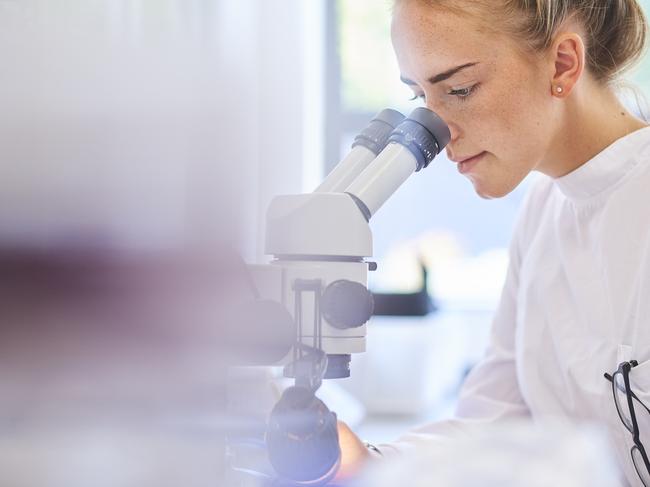Personalised drug trials on horizon as lab recreates ‘tumours’
Imagine if doctors could test how your cancer will respond to different drugs without giving you a single one? Welcome to the world of personalised medicine.

Cancer
Don't miss out on the headlines from Cancer. Followed categories will be added to My News.
A Melbourne laboratory is successfully growing mini tumours from patients’ own cancer cells in a bid to ensure women get matched to the best possible treatment.
The goal is to create a process where doctors can use these test-tube tumours to run mini, personalised drug trials for individual ovarian cancer patients.
The research team, led by Cabrini Cancer and Monash University’s Biomedicine Discovery Institutes, can create the lab-grown ‘tumours’, known as organoids, in as little as two weeks.
They plan to be able to trial ‘real-time’ drug tests – meaning they would be fast enough to give doctors insight into a patient’s options – in just 12 months.
The trial is open to hospitals across Australia.
They have already successfully created organoids for three different patients with ovarian cancer in the trial’s first stage, offering real hope against a cancer that kills more than 1000 Australians a year.
Cabrini research director Professor Gary Richardson said we had “really hit the age of personalised medicine”, where patients get tailor-made treatment that is unique to them.
“The days of 10 people coming in with ovarian cancer and all being treated exactly the same are going to radically change over the next few years,” he said.
“The characteristics of each of their tumours will be quite different and so they’re going to end up having different drugs and different treatments and in doing that individually we’ll have much better outcomes.”

He said the different types of cells within an ovarian cancer patient’s tumour did not always respond to the same drugs.
“So one drug will kill some of the cells off, one immunotherapy will kill some of the cells off, but often they won’t kill all of it off,” he said.
But he said the organoid, which they only need a small piece of tumour tissue to create, could mimic these differences, enabling them to test their responses to various treatments.
“It makes it much easier to be able to work out what the best treatment is for someone,” he said.
He said researchers could repeatedly grow and split the one organoid again and again, allowing them to make multiple copies for different experiments for one person.
“[Part of it] goes straight into the biobank for future research so if we discover something we can actually thaw these things out and reuse them,” he said.
He said the organoids benefits were not limited to research on an individual patient, and they could be used to help develop new drugs, understand how ovarian cancers resist certain treatment and identify pathways for earlier diagnoses.
The biobank, which will be the nation’s first comprehensive library of ovarian cancer organoids, will be accessible to researchers across Australia.
Melbourne’s Helen Goode was the first patient to donate tissue to the program and said it was a “privilege”.
The university lecturer was diagnosed with stage 4 ovarian cancer last November after she mentioned she was more bloated than usual while at a GP appointment for an unrelated issue.
She said she knows she likely won’t get to see the benefits herself, but felt grateful to be involved with research that could help other women in the future.
“It’s really about helping mankind, it’s not about yourself,” she said.
“Just to be part of a trial is a real privilege.”
Originally published as Personalised drug trials on horizon as lab recreates ‘tumours’


